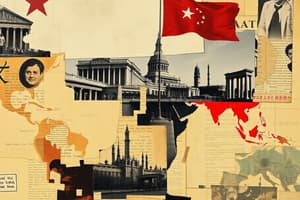Podcast
Questions and Answers
How is international relations defined as a subfield of political science?
How is international relations defined as a subfield of political science?
The study of the interactions among the various actors that participate in international politics.
Which of the following is NOT a prominent theory in international relations, as discussed in the text?
Which of the following is NOT a prominent theory in international relations, as discussed in the text?
- Radical Perspectives
- Constructivism
- Neoliberal Institutionalism
- Classicism (correct)
- Realism
- Liberalism
According to realism, states exist in an anarchic international system, meaning there is a hierarchical governing body.
According to realism, states exist in an anarchic international system, meaning there is a hierarchical governing body.
False (B)
Liberalism historically posits that human nature is inherently evil.
Liberalism historically posits that human nature is inherently evil.
What are the three levels of analysis used in international relations, as mentioned in the text?
What are the three levels of analysis used in international relations, as mentioned in the text?
What did Thucydides, the ancient Greek historian, identify as the underlying cause of the Peloponnesian War?
What did Thucydides, the ancient Greek historian, identify as the underlying cause of the Peloponnesian War?
Which of the following is NOT a reason why drawing specific lessons from historical analogies can be problematic?
Which of the following is NOT a reason why drawing specific lessons from historical analogies can be problematic?
What did Plato, in his work "The Republic", argue should be the ideal rulers of a state?
What did Plato, in his work "The Republic", argue should be the ideal rulers of a state?
What two key ideas from Plato's work have influenced contemporary Marxist analysts?
What two key ideas from Plato's work have influenced contemporary Marxist analysts?
What was Aristotle's contribution to the study of political science, as described in the text?
What was Aristotle's contribution to the study of political science, as described in the text?
In Thomas Hobbes's "Leviathan", what was his description of the state of nature and how did he propose to escape it?
In Thomas Hobbes's "Leviathan", what was his description of the state of nature and how did he propose to escape it?
What was Rousseau's solution to the dilemma posed by the stag and the hare?
What was Rousseau's solution to the dilemma posed by the stag and the hare?
What did Immanuel Kant propose as a means to achieve peace in international relations?
What did Immanuel Kant propose as a means to achieve peace in international relations?
The text states that philosophical methods, while helpful in identifying normative guidelines, may not be as effective in addressing specific, practical questions.
The text states that philosophical methods, while helpful in identifying normative guidelines, may not be as effective in addressing specific, practical questions.
What is the name of the book written by psychologist Steven Pinker that examines the decline of violence in human history?
What is the name of the book written by psychologist Steven Pinker that examines the decline of violence in human history?
Which of the following is NOT one of the four prominent theories of international relations discussed in the text?
Which of the following is NOT one of the four prominent theories of international relations discussed in the text?
Realists believe that states exist in an anarchic international system, meaning there is no overarching hierarchical authority.
Realists believe that states exist in an anarchic international system, meaning there is no overarching hierarchical authority.
Liberalism, in contrast to realism, sees human nature as fundamentally good and emphasizes the potential for cooperation between states.
Liberalism, in contrast to realism, sees human nature as fundamentally good and emphasizes the potential for cooperation between states.
What is dialectical reasoning?
What is dialectical reasoning?
What did Aristotle conclude about the rise and fall of states?
What did Aristotle conclude about the rise and fall of states?
What is Leviathan, according to Thomas Hobbes?
What is Leviathan, according to Thomas Hobbes?
What did Immanuel Kant advocate for in his work, Idea for a Universal History and Perpetual Peace?
What did Immanuel Kant advocate for in his work, Idea for a Universal History and Perpetual Peace?
What are some of the fundamental relationships examined by the philosophical tradition in International Relations?
What are some of the fundamental relationships examined by the philosophical tradition in International Relations?
Philosophical methods are always useful for helping us answer specific questions in International Relations.
Philosophical methods are always useful for helping us answer specific questions in International Relations.
Flashcards
International Relations
International Relations
The study of interactions among actors in international politics, including states, organizations, and individuals.
International Relations Theory
International Relations Theory
Frameworks for understanding international events and answering foundational questions in the field.
Realism
Realism
A theory that states exist in an anarchic international system, focusing on national interest and power.
Neorealism
Neorealism
Signup and view all the flashcards
Liberalism
Liberalism
Signup and view all the flashcards
Neoliberal Institutionalism
Neoliberal Institutionalism
Signup and view all the flashcards
Radical Perspective
Radical Perspective
Signup and view all the flashcards
Constructivism
Constructivism
Signup and view all the flashcards
Anarchy
Anarchy
Signup and view all the flashcards
National Interest
National Interest
Signup and view all the flashcards
State of Nature
State of Nature
Signup and view all the flashcards
Levels of Analysis
Levels of Analysis
Signup and view all the flashcards
Historical Context
Historical Context
Signup and view all the flashcards
Behavioralism
Behavioralism
Signup and view all the flashcards
Scientific Method
Scientific Method
Signup and view all the flashcards
Philosophy in IR
Philosophy in IR
Signup and view all the flashcards
History in IR
History in IR
Signup and view all the flashcards
Analogies
Analogies
Signup and view all the flashcards
Global Perspectives
Global Perspectives
Signup and view all the flashcards
IGOs
IGOs
Signup and view all the flashcards
NGOs
NGOs
Signup and view all the flashcards
International Law
International Law
Signup and view all the flashcards
Power
Power
Signup and view all the flashcards
What is International Relations?
What is International Relations?
Signup and view all the flashcards
What are Theories in IR?
What are Theories in IR?
Signup and view all the flashcards
What is Realism?
What is Realism?
Signup and view all the flashcards
What is Neorealism?
What is Neorealism?
Signup and view all the flashcards
What is Liberalism?
What is Liberalism?
Signup and view all the flashcards
What is Neoliberal Institutionalism?
What is Neoliberal Institutionalism?
Signup and view all the flashcards
What is the Radical Perspective?
What is the Radical Perspective?
Signup and view all the flashcards
What is Constructivism?
What is Constructivism?
Signup and view all the flashcards
What is Anarchy?
What is Anarchy?
Signup and view all the flashcards
What is National Interest?
What is National Interest?
Signup and view all the flashcards
What is the State of Nature?
What is the State of Nature?
Signup and view all the flashcards
What are Levels of Analysis?
What are Levels of Analysis?
Signup and view all the flashcards
What is Historical Context?
What is Historical Context?
Signup and view all the flashcards
What is Behavioralism?
What is Behavioralism?
Signup and view all the flashcards
What is the Scientific Method?
What is the Scientific Method?
Signup and view all the flashcards
What is Philosophy in IR?
What is Philosophy in IR?
Signup and view all the flashcards
What is History in IR?
What is History in IR?
Signup and view all the flashcards
What are Analogies?
What are Analogies?
Signup and view all the flashcards
What are Global Perspectives?
What are Global Perspectives?
Signup and view all the flashcards
What are IGOs?
What are IGOs?
Signup and view all the flashcards
What are NGOs?
What are NGOs?
Signup and view all the flashcards
What is International Law?
What is International Law?
Signup and view all the flashcards
What is Power?
What is Power?
Signup and view all the flashcards
What is the purpose of International Relations?
What is the purpose of International Relations?
Signup and view all the flashcards
What are some challenges to the state?
What are some challenges to the state?
Signup and view all the flashcards
Why do we need history in IR?
Why do we need history in IR?
Signup and view all the flashcards
What are the potential impacts of individuals on international relations?
What are the potential impacts of individuals on international relations?
Signup and view all the flashcards
Why are IGOs, International Law, and NGOs important?
Why are IGOs, International Law, and NGOs important?
Signup and view all the flashcards
What are the major issues in contemporary international relations?
What are the major issues in contemporary international relations?
Signup and view all the flashcards
Study Notes
Approaches to International Relations
- International relations is the study of interactions among actors in international politics, including states, individuals, international organizations, and NGOs.
- It's an interdisciplinary field, drawing on history, economics, and anthropology, as well as political science.
- Key questions in IR include the characteristics of human nature and states, the relationship between individuals and society, and the structure of the international system.
- Competing theories (realism, liberalism, radical theory, constructivism) offer different perspectives on these questions.
- Realism posits that states operate in an anarchic system, prioritizing national interests defined by power. Liberalism emphasizes cooperation and international norms. Radical theory focuses on economic class and international capitalism. Constructivism emphasizes social and ideational structures.
Developing the Answers
- History is crucial for understanding contemporary issues, tracing the origins of conflicts and disputes.
- History helps identify patterns and potential causes of events (e.g., Thucydides' analysis of the Peloponnesian War).
- Historical analogies can be helpful but are limited; outcomes are influenced by diverse factors and context.
- Philosophy contributes to IR by examining fundamental questions about human nature, state characteristics, and the ideal international system (e.g., Plato, Aristotle, Hobbes, Rousseau, Kant).
- Philosophical analysis identifies normative considerations, like justice in war and resource distribution.
Thinking Theoretically
- Political scientists develop theories to understand international events and answer foundational questions.
- Prominent theories in IR include realism, liberalism, radical perspectives (rooted in Marxism), and constructivism.
Studying That Suits You
Use AI to generate personalized quizzes and flashcards to suit your learning preferences.




